Randy Alcorn's Blog, page 119
April 18, 2018
Paul Young’s “Lies We Believe About God” Dismantles Precious Truths from Scripture

I wrote what follows nearly a year ago. I didn’t post it then because honestly, I hate to get involved in quarrels with the many people who will disagree. But as time goes on, I continue to see people adversely influenced by the theology expressed in this book. While it’s increasingly popular today, it stands in conflict with God’s Word. So I will go ahead and post it now.
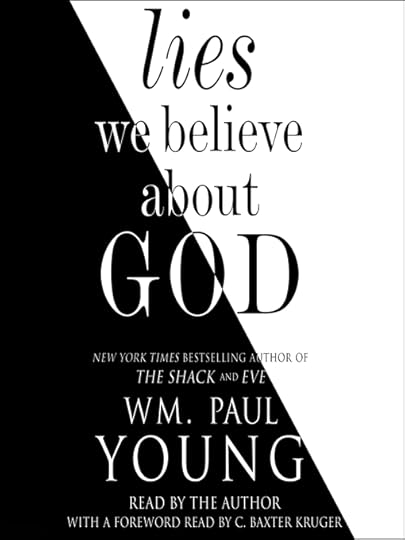 Last year, Paul Young, author of The Shack, had a book come out called Lies We Believe About God. Ironically, many of the doctrinal concerns that I and many others expressed about his novel The Shack (and in response, were told “it’s just fiction” and “this isn’t theology” and “that’s not what he’s saying”) have proven to be true. This book clearly reveals the author’s actual theology.
Last year, Paul Young, author of The Shack, had a book come out called Lies We Believe About God. Ironically, many of the doctrinal concerns that I and many others expressed about his novel The Shack (and in response, were told “it’s just fiction” and “this isn’t theology” and “that’s not what he’s saying”) have proven to be true. This book clearly reveals the author’s actual theology.
I wanted to believe the best, and not be quick to misunderstand or accuse. I have friends who read Paul’s writings, and my desire isn’t to take away from the positives they’ve received from The Shack. However, Lies We Believe About God shows in the author’s own words how far he has departed from some basic and central evangelical doctrines. I’ve read the whole book, and I saw truth intermixed with unbiblical error. But as is often the case with false doctrine, the truth serves to make the error appear more credible.
Given the book’s popularity, and the subsequent release of the movie by the same title, I’m disappointed and concerned that the countless people influenced by The Shack and many of its more implicit errors will be led into increasingly significant explicit errors by reading Lies We Believe About God.
To be clear, The Shack has many explicit errors too, but people debated or seemed to not notice what the author was really saying. Many were able to overlook some of the theological problems while at the same time being impacted by the good they found. But in Lies We Believe About God, Paul Young has stated more forthrightly not only his universalism, but also a number of other unbiblical doctrines.
He admits at last (several years ago, I had two three-hour conversations with him in which he hinted this without saying it directly) he really is a universalist: “Are you suggesting that everyone is saved? That you believe in universal salvation? That is exactly what I am saying!” (p. 118). That makes it official: no more arguments about whether The Shack teaches universalism.
Some of what Lies We Believe About God says about the evangelical view of the cross of Christ makes it sound like those who teach substitutionary atonement would actually be pro-child abuse. In fact, Scripture reveals a Father who sent His Son, and a Son, coeternal and coequal with the Father and the Holy Spirit, who willingly laid His life down for us on the cross (John 10:17-18). He was and is the God-man, and He was both sent by the Father and went willingly to the cross, not as a helpless or victimized child. (See Bruce Ware’s article The Father Sent Jesus to the Cross.)
In reading Lies We Believe About God, at times I marveled at all the precious truths the author is calling outright falsehoods. Below are some statements he claims are all lies, along with some quotes from the book:
God is good. I am not.
God is in control.
“God submits rather than controls and joins us in the resulting mess of relationship, to participate in co-creating the possibility of life, even in the face of death.” (p. 44)
God does not submit.
“What is the incarnation—God becoming fully human—if not complete and utter submission to us? What about the cross, in which God submits to our anger, rage, and wrath?” (p. 48)
God wants to use me.
You need to get saved.
“The Good News is not that Jesus has opened up the possibility of salvation and you have been invited to receive Jesus into your life. The Gospel is that Jesus has already included you into His life, into His relationship with God the Father, and into His anointing in the Holy Spirit. The Good News is that Jesus did this without your vote, and whether you believe it or not won’t make it any less or more true.” (pp. 117-118)
Hell is separation from God.
“I propose the possibility that hell is not separation from Jesus but that it is the pain of resisting our salvation in Jesus while not being able to escape Him who is True Love.” (p. 138)
Not everyone is a child of God.
Sin separates us from God.
“Does sin separate us from God? Separation is the fundamental building block of religion. …Once division and separation are established as real, entire religious systems, institutions, and hierarchies can be built as the path to salvation or enlightenment, and people will pay blood, sweat, tears, and money to get from the damned side to the saved. We Christians have long espoused a theology of separation. A lot of ‘my people’ will believe that the following statement is in the Bible, but it isn’t: ‘You have sinned, and you are separated from God.’” (pp. 230-231)
The Cross was God’s idea.
These are not lies! They are truths, and there is plenty of biblical support for each of them. Of course, not everything everyone says related to these truths is accurate (but that’s always true). To say these are all “lies” is unbiblical, irresponsible, and misleading.
While I could elaborate with a number of Scriptures for each of these, take just the last one, said to be a lie: the Cross was God’s idea. Acts 4:27-28 says, “Indeed Herod and Pontius Pilate met together with the Gentiles and the people of Israel in this city to conspire against your holy servant Jesus, whom you anointed. They did what your power and will had decided beforehand should happen.”
We could add the words of Isaiah 53, that Jesus was “punished by God, stricken by him, and afflicted. But he was pierced for our transgressions, he was crushed for our iniquities; the punishment that brought us peace was on him, and by his wounds we are healed. We all, like sheep, have gone astray, each of us has turned to our own way; and the LORD has laid on him the iniquity of us all…for the transgression of my people he was punished….though he had done no violence, nor was any deceit in his mouth. Yet it was the LORD’s will to crush him and cause him to suffer.”
Here is a book supposedly identifying lies we believe about God while dismantling biblical truths at the heart of the Gospel message. It attempts to replace these truths with ACTUAL untruths, lies about God!
If it seems unfair for someone to say the author is speaking lies, consider that his entire book is dedicated to the idea that evangelical pastors and Christ-followers who have been teaching these biblical doctrines for hundreds or thousands of years are liars.
The truth is, we desperately need to be saved by Jesus—that is, to embrace what He has provided on our behalf: “We implore you on behalf of Christ, be reconciled to God” (2 Corinthians 5:20). We need to be saved from our sins, to be rescued, delivered, reconciled, and born again, so we can enter into God’s goodness and the righteousness of Jesus.
I recommend this summary of some of the unbiblical content in Lies We Believe About God, well expressed by Tim Challies.
While Paul Young remains a likable person, this doesn’t change the danger of revising God’s truth and telling people nice-sounding things on God’s behalf, when some of those explicitly contradict what He tells us in His Word: “Every word of God proves true; he is a shield to those who take refuge in him. Do not add to his words, lest he rebuke you and you be found a liar” (Proverbs 30:5-6).
What God said to Jeremiah about the dreams and words of so-called prophets in that day applies to us today when it comes to our choice between believing what God has said in His revealed Word, or believing the new and more appealing things that people say to replace the biblical teachings:
“I have heard what the prophets say who prophesy lies in my name. They say, ‘I had a dream! I had a dream!’ How long will this continue in the hearts of these lying prophets, who prophesy the delusions of their own minds? They think the dreams they tell one another will make my people forget my name, just as their ancestors forgot my name through Baal worship.
“Let the prophet who has a dream recount the dream, but let the one who has my word speak it faithfully. For what has straw to do with grain?” declares the Lord. “Is not my word like fire,” declares the Lord, “and like a hammer that breaks a rock in pieces?
“Therefore,” declares the Lord, “I am against the prophets who steal from one another words supposedly from me. Yes,” declares the Lord, “I am against the prophets who wag their own tongues and yet declare, ‘The Lord declares.’
“Indeed, I am against those who prophesy false dreams,” declares the Lord. “They tell them and lead my people astray with their reckless lies, yet I did not send or appoint them. They do not benefit these people in the least,” declares the Lord.
—Jeremiah 23:25-32
For more on the topic of truth, see Randy Alcorn’s devotional Truth: A Bigger View of God’s Word .
Photo by Aaron Burden on Unsplash
April 16, 2018
Nine of My Spiritual Heroes
I have only one Lord, but many spiritual heroes. Here are nine of mine. (This is a repost of an article I shared several years ago; this version has been expanded and updated with links to more on each of my heroes.)
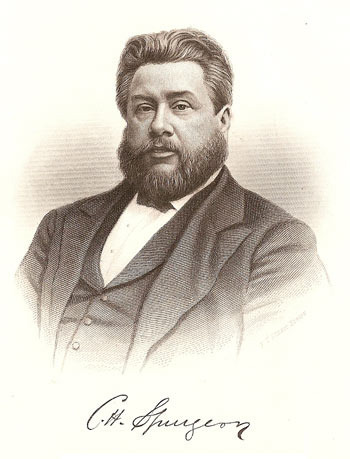 1) Pastor Charles Haddon Spurgeon
1) Pastor Charles Haddon SpurgeonEven as a twenty year old, Spurgeon spoke with an incredible depth and biblical insight, and his sermons and writings, which are full of grace and truth (and unsurpassed eloquence), always draw me to Christ. He led his church in building homes to care for elderly women and orphans, as well as a large school for hundreds of children.
I wrote an introduction and conclusion about Spurgeon in my book We Shall See God, and quoted from his Heaven sermons extensively (the book is 60% Spurgeon). I’ve also blogged about him over the years, including in Charles Spurgeon Meets Rapper Shai Linne, Spurgeon’s Worst Sermon, and His Joy and Fruitfulness in Ministry, Born Out of Suffering and Sorrow. Several years ago when I was experiencing a season of depression, I wrote three posts about Spurgeon’s personal depression experience.
 2) Eric Liddell
2) Eric LiddellEric was an Olympic champion and missionary to China (best known from the movie Chariots of Fire), whose “rest of the story” was told to me by a woman in England, Margaret Holder. I share in my book The Grace and Truth Paradox how as a teenager Margaret lived in a Japanese internment camp in China, where Eric Liddell was also imprisoned and ended up dying of a brain tumor. She spoke of how Liddell held the camp together by his devotion to Christ and care for the children, who after his death were dramatically rescued by American paratroopers. See The Little Known Story of Olympian Eric Liddell’s Final Years.
 3) Keith Green
3) Keith GreenKeith’s songs resonated with my soul more than anyone’s. I can still hear him pounding on that piano and singing “There is a Redeemer.” (“Thank you, oh my Father, for giving us Your Son, and leaving Your Spirit, till the work on Earth is done.”) I remember in 1982 I was at our church office, where I was a pastor, when I heard that his plane had crashed. Keith was 28 years old, the same age as Nanci and I were. I loved his passion for Christ, and I still listen to his music on my iPod. Jon Bloom, co-founder of Desiring God, shared some great thoughts about Keith and his impact.
 4) Francis Schaeffer
4) Francis SchaefferSchaeffer was an intellectual and Christ-lover, who responded with a wonderful handwritten letter to me after I wrote to him as a college student, telling him how God had shaped me through his books. (On the 25th anniversary of his home going, I shared the letter he sent me.) I loved all his books, but my all-time favorite was He Is There and He Is Not Silent. Schaeffer also awakened me to the importance of the prolife issue.
My friend Doug Nichols shared a wonderful story about Francis and his humility. Also see my tribute to his wife Edith.
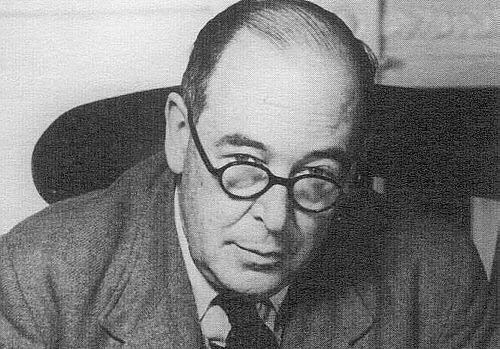 5) C. S. Lewis
5) C. S. LewisLewis not only wrote books that have touched me to the core, but also in a spirit of humility and kindness answered letters from those who had nothing to offer him. He gave away the majority of his royalties to the needy.
Nanci and I have been to Oxford several times, visiting Lewis’s college, chapel, rooms, his house the Kilns, and his favorite pubs. We walked Addison’s Walk, where he was helped to come to faith in a conversation with two friends, one of them J. R. R. Tolkien. I share some memories of our visit with our girls here, and some pictures and memories from one of Nanci’s and my trips here.
I didn’t know of Lewis until I picked up The Problem of Pain as a new Christian in 1969. In my books, I cite Lewis far more than anyone else besides Scripture. He’s even a character in my novel Dominion. (Yes, there are any number of areas in which I disagree with Lewis, but the quotes from him I put in my books are very insightful observations in which I do agree with him.)
I wrote a couple of blogs about his impact on my life and writing. And at the 2013 Desiring God National Conference, I gave a presentation about C.S. Lewis on Heaven and the New Earth.
 6) Joni Eareckson Tada
6) Joni Eareckson TadaJoni’s life resonates with depth, honesty, compassion, and Christ’s joy. Through adversity God has made a diamond out of her. (In fact, that’s the theme of a message she shared several years ago, how God uses suffering to refine us.) We’ve made an appointment to run together in a meadow on the New Earth. I’m sure she’ll have to slow down to let me catch her. Nanci and I love Joni. We have great memories of an evening spent with her and Ken in their home.
Joni gave a wonderful message last year at our church’s Sanctity of Human Life Sunday service. Here’s a blog and video I did last year in honor of the 50th anniversary of her life-altering accident. I’ve also shared several posts about or by Joni over the years on my blog.
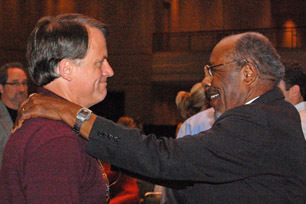 7) John Perkins
7) John PerkinsJohn was tortured and humiliated in a Mississippi jailhouse for the crime of being black, but rose above the hatred to become the Voice of Calvary. I have never seen greater love coming out of a man. Except for the grace of Jesus, there is no explanation for such a life.
When researching my novel Dominion, I walked with John through Jackson, Mississippi. I was with him when he bought a hat in one of their ministry thrift stores for a quarter. They wanted to give it to him, since he founded the whole ministry, but he insisted on paying. John was my spiritual inspiration for the character Obadiah Abernathy in Dominion.
They have a daily newspaper at the Christian booksellers’ convention, and one day it had this picture of me talking with John. So I asked for a copy of it. It still brings tears to my eyes. What a guy! It was an honor to write the foreword to his book Dream With Me.
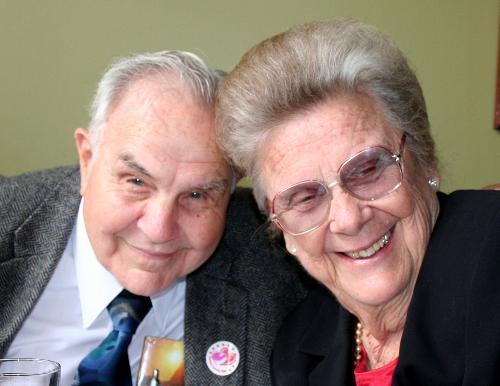 8) Bert Elliot
8) Bert ElliotBert is brother of martyred missionary Jim Elliot (another one of my heroes). He and his wife Colleen served as missionaries in South America for over sixty years. Bert said something to me the day I met him that I’ll never forget: “Jim and I both served Christ, but differently. Jim was a great meteor, streaking through the sky.” Unlike his brother Jim, the shooting star, Bert was a faint star that rose night after night, faithfully crossing the same path in the sky, to God’s glory. I share more about that meeting with him and his wife in this blog.
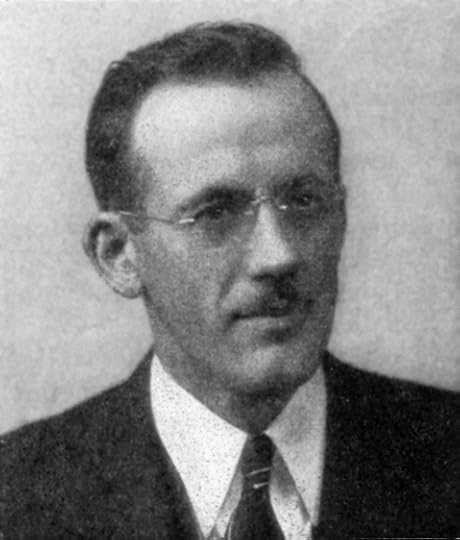 9) A. W. Tozer
9) A. W. TozerTozer is one of three authors who had the most profound influence on me as a young Christian (the other two are Lewis and Schaeffer). He continues to impact me. Tozer’s The Knowledge of the Holy, a fabulous book on the attributes of God, is my favorite nonfiction book of all time. I’ve shared several blogs over the years featuring excerpts from his books.
Tozer’s insights about God’s character have been of great encouragement again to Nanci and I lately, as we face the many unknowns of this year with her colon cancer treatments.
These are some of the people whose writings and lives have shaped mine, and to whom I will repeatedly say “Thank you” in the ages to come (always thanking Christ, the Source of all joys, for them). And of course, there are many more people the Lord has used in my life over the years through personal relationship, including godly men and women at our home church, such as Jim Spinks, Cal Hess, and Garland Gabbert.
What a pleasure to know I will live forever with the Lord I worship and the people, His servants, I admire. Likely many of those I will come to admire most, and ask to sit next to at dinner, are ones whose stories I don’t even know yet. I can’t wait to meet them!
April 13, 2018
A Prayer to the Shepherd of My Life

Earlier this year, my wife and best friend Nanci was diagnosed with colon cancer, and is now beginning a combination of radiation and chemotherapy treatments. (You can read more on her Caring Bridge page; we would really appreciate your prayers.) Nanci recently wrote a prayer based on Psalm 23. It spoke to me, and I hope it speaks to you too, as you reflect on your heavenly Shepherd and the ways He leads and cares for you through every circumstance. Read Psalm 23 first, then enter into Nanci’s prayer. —Randy Alcorn
Psalm 23:
The Lord is my shepherd;
I shall not want.
He makes me to lie down in green pastures;
He leads me beside the still waters.
He restores my soul;
He leads me in the paths of righteousness
For His name’s sake.
Yea, though I walk through the valley of the shadow of death,
I will fear no evil;
For You are with me;
Your rod and Your staff, they comfort me.
You prepare a table before me in the presence of my enemies;
You anoint my head with oil;
My cup runs over.
Surely goodness and mercy shall follow me
All the days of my life;
And I will dwell in the house of the Lord
Forever.
Nanci Alcorn’s prayer:
Please, Shepherd of my life,
Cause me to want nothing more—not even good health—than to have you as my Shepherd.
Reveal to me that the pastures and waters to which you lead me are green and still—because you are there!
Engage my heart to receive the restoration of my soul by your Holy Spirit.
Renew my conviction that, for your name’s sake, righteousness is the direction of each path you have for me.
May your Holy Spirit—the Comforter—banish all my fears of evil (being out of control, letting pride inflate me, weakness, pain, loss of plans) as I walk through this valley—because you are with me!
Open my eyes and my ears to the protection and comfort of your rod and staff. Don’t let me miss those things and people which you have provided me for this purpose.
Help me experience the table you have prepared for me in the presence of this cancer.
Don’t let me overlook—or fail to ask for—your every healing drop of oil on my head.
Keep my perspective on my daily overflowing cup of your goodness and mercy.
Direct my longing toward my place in your house, forever!
Photo by Jaka Škrlep on Unsplash
April 11, 2018
The Early Christians Experienced Happiness in Christ Despite Suffering; So Can We

Recently Nanci and I saw the movie Paul, Apostle of Christ. We were both surprised at how dark it was, focusing almost exclusively on Rome’s brutal violence done against Christians and their children. Paul is suffering in prison nearly all the movie, and even the flashbacks are either him suffering or inflicting suffering on others.
Of course, historically there was plenty of such violence, and we don’t want it whitewashed! That’s not my concern. But Paul’s life contained many events that were beautiful—including strong relationships, miracles, healings, demons cast out, and radical conversions with infusions of happiness. We wished for a few happy flashbacks of the joy he experienced knowing and serving Jesus, as seen throughout the book of Acts. (Given the good reviews I read, no doubt God is using the movie in some people’s lives. And if you’re among them, that’s great!)
It also seemed odd to show the community of faith’s suffering endlessly without depicting their joy. In the movie, the believers in hiding are portrayed as divided and squabbling and nearly always distraught. I’m all for realistic portrayals of suffering and hardship (I’ve written three books on the problem of evil and suffering), and certainly first-century Christians experienced much heartbreak and persecution. But they also experienced happiness, celebration, and the abundant life in the midst of difficulty. Their lives were punctuated by feasting and singing and laughing and rejoicing. (It almost feels like there’s an underlying assumption in this movie that God has called His people to unhappiness in this life and that happiness is unspiritual. I address this issue here.)
Nanci and I felt like the takeaway was, “Christians live miserable lives now, but in the end Heaven will make up for it.” Well, true, Heaven will more than make up for a miserable life, but the early Christians, while enduring some miseries to be sure, were characterized in this life by a transcendent joy and hope and peace.
The Early Church’s Happiness in Jesus
We see the seeds of the early church’s happiness right away after Jesus ascended (Luke 24:51-52): “While he blessed them, he parted from them and was carried up into heaven. And they worshiped him and returned to Jerusalem with great joy.” The CEV says, “They returned to Jerusalem and were very happy.” Because Jesus was alive, and because he promised to be with his followers always and return for them one day, their joy went deep and overflowed the banks of their lives.
The early church enjoyed both the Lord’s Supper (breaking bread) and “love feasts” (Jude 1:12). Acts 2:46 describes the gatherings of the believers: “Day after day they met together in the temple. They broke bread together in different homes and shared their food happily and freely” (CEV).
There’s an intriguing phrase in Acts 2:47 that describes the church in Jerusalem as “having favor with all the people.” What exactly were these early Christians doing that brought them such esteem? The preceding verses tell us: “And they were selling their possessions and belongings and distributing the proceeds to all, as any had need. And day by day, attending the temple together and breaking bread in their homes, they received their food with glad and generous hearts” (v. 45-46).
When unbelievers witnessed the generosity and joy of these believers, they saw how they loved one another, and many came to faith: “And the Lord added to their number day by day those who were being saved” (Acts 2:47, italics mine). Their open hands and genuine happiness demonstrated the life-changing power of the gospel.
Athenian philosopher Aristides wrote to the Emperor Hadrian (c. 117-138 AD) and said this about the early church:
Every morning and all hours on account of the goodness of God toward them, they render praise and laud Him over their food and their drink; they render Him thanks. And if any righteous person of their number passes away from this world, they rejoice and give thanks to God and they follow his body as though he were moving from one place to another. And when a child is born to them, they praise God, and if again it chances to die in its infancy, they praise God mightily, as for one who has passed through the world without sins.
Supernatural Joy and Gladness in Persecution
Scripture tells us something even more surprising. When believers in the early church faced persecution for following Jesus, this was their response: “They left the presence of the council, rejoicing that they were counted worthy to suffer dishonor for the name” (Acts 5:41). The Contemporary English Version and five others translate it, “They were happy.” How could anyone be happy in suffering? Because they found joy in being enough like Jesus to be treated as He had been. Note that they rejoiced not because they suffered (self-glorifying masochism) but because they were considered worthy to suffer for Jesus (God-glorifying grace).
We see this same supernatural reality in other passages (see Matthew 5:12; Romans 5:3; James 1:2-3; 1 Peter 4:13). It’s as if our eternal happiness works its way backward into the suffering of the present moment, washing over us as a foretaste of our imminent, unending joy.
Consider what happened to Paul and Silas in Philippi: “The crowd joined in attacking them, and the magistrates tore the garments off them and gave orders to beat them with rods. And when they had inflicted many blows upon them, they threw them into prison. . . . [The jailer] put them into the inner prison and fastened their feet in the stocks” (Acts 16:22-24).
Sadly, God’s people have been treated this way throughout history, but the next verse is astonishing: “About midnight Paul and Silas were praying and singing hymns to God, and the prisoners were listening to them” (verse 25). Why were the prisoners listening? Because to sing hymns is to express praise and joy and focus on God, not oneself.
Such actions speak powerfully to unbelievers. Words alone are cheap, but joy in suffering gets people’s attention—it demands a supernatural explanation! Countless believers have used their platform of suffering, combined with Christ-centered happiness, to attract people to the gospel.
Paul’s Rejoicing in the Lord
Paul’s joyful, peaceful response to imprisonment in Philippi was characteristic of his walk with Jesus, although yes, as a result of following Christ, he lost everything. He described his daily adversity, persecution, and nearness to death (2 Corinthians 4:7-12). Two chapters later Paul referred to his troubles, hardships, distresses, beatings, imprisonments, riots, sleepless nights, and hunger, as well as the experience of nearly dying, and being sorrowful and poor (2 Corinthians 6:3-10). And in chapter 11, he wrote an even more graphic portrayal of his hardships (v. 23-29). Ultimately, his imprisonment led to his death at Nero’s command.
Yet this same Paul said he was “sorrowful, yet always rejoicing” (2 Corinthians 6:10). Sorrow and joy can and do coexist, for now. Note that the “always” in this verse is applied to rejoicing, not being sorrowful. Sometimes sorrow and joy do battle; sometimes they coexist, but when our hearts and minds are on Christ, joy is never far away: “You changed my sorrow into dancing. You took away my clothes of sadness, and clothed me in happiness” (Psalm 30:11, NCV).
Paul, writing from prison in Rome, calls on us to rejoice in the Lord not periodically, but always: “Rejoice in the Lord always. I will say it again: Rejoice!” (Philippian 4:4). Surely, with the Holy Spirit’s help, he followed his own instructions! That word translated rejoice means to be glad, to be happy, to delight in, to find pleasure in. The Hebrew and Greek words that are translated joy are synonyms of happiness. This verse could just as easily be translated, “Be happy in the Lord; again I say be happy.” But notice what we’re to be happy in. We’re to be happy in the Lord.
Paul followed verse 4 with this encouragement: “The Lord is at hand,” which itself is a reason to rejoice. God is with us, never abandons us, and will deliver us soon, whether by death or by His return.
Paul understood that those who know Christ can be happy in Him when every outward circumstance argues against being happy. This is what David experienced when he wrote, “When the cares of my heart are many, your consolations cheer my soul” (Psalm 94:19). It’s what James and Peter were saying when they told believers to be glad when facing hardships (see James 1:2; 1 Peter 4:13).
Nowhere in Scripture is happiness reserved for when life seems to be going our way. Life’s dramas constantly conspire to rob us of joy. But these circumstances, and our short-comings, aren’t nearly as big or as permanent or as powerful as God and His happiness, which in His grace He offers His beloved children. And this offer is not just for “then and there,” after we die, but for “here and now,” while we still live in a fallen world, in and with and by the grace of a risen Jesus. The apostle Paul and the rest of the early church experienced this kind of supernatural happiness, and because the same Holy Spirit that indwelt them lives in us, so can we.
By the way, if you’d like to study Paul’s life more, I recommend first reading or listening to the book of Acts and letters of Paul. If you want a quick illustrated read on the apostle Paul see my graphic novel The Apostle. I spent a lot of time studying his life to write it, and chose many of the great action scenes in Acts and added some scenes to tie it together. Or if you want a serious biography, The Apostle: A Life of Paul is a classic.
Photo: iStock
April 9, 2018
The MLK50 Conference on Why Racial Unity Is a Gospel Issue (and Some Thoughts About John Perkins)

Last week, the Ethics & Religious Liberty Commission and The Gospel Coalition hosted the MLK50 Conference, which focused on the state of racial unity in the church and the culture 50 years after Martin Luther King Jr.’s death. I watched parts of the conference over their free livestream, and one of our EPM staff members, Kathy Norquist, watched all of it. She wrote this:
I’m so glad Randy encouraged our staff to watch the livestream. If you’ve ever thought “I wish they would stop playing the race card” or “I’m glad racial discrimination is behind us” or “It wasn’t me personally who participated in the past so quit blaming us” then I urge you to watch these videos. You might not always like what’s being said or agree 100%, but go with an open mind and listen, listen, listen to these godly men and women who love Jesus and seek to live for Him. I had a lot of questions in my mind and most of them were answered through the panel discussions. I wish this conference could be repeated all over the U.S. as, I for one, would be there!
I wholeheartedly agree. To watch the videos, sign up here. After you do so, you’ll be able to scroll down and choose the sessions you’d like to watch.
I really appreciated Russell Moore’s opening address, “Black and White and Red All Over: Why Racial Justice Is a Gospel Issue.” Mika Edmonson’s message titled “The Power of Unearned Suffering: Celebrating MLK’s Legacy after 50 Years,” was powerful, as was Matt Chandler’s session on “A House Divided Cannot Stand: Understanding and Overcoming the Inconsistencies in White Evangelicals on Racial Issues.” Other speakers included Benjamin Watson, Ralph West, John Piper, Jackie Hill Perry, and Eric Mason.
And don’t miss the session with one of my heroes, John Perkins, who talked about “The Civil Rights Movement 50 Years after MLK.” Years ago John was tortured and humiliated in a Mississippi jailhouse for the crime of being black, but rose above the hatred to become the Voice of Calvary. Except for the grace of Jesus, there is no explanation for such a life.
 I first met John when we spoke at a conference together in Minnesota in 1987. Eight years later I went to Jackson, Mississippi to spend time with John when researching my novel Dominion, and modeled parts of my character Obadiah Abernathy after him. In 2008, the Evangelical Christian Publishers Association honored John Perkins with the Lifetime Achievement Award. After John spoke, I waited at a distance. Though ten years had passed since we’d last seen each other, his face lit up when he saw me, and he called me by name. A photographer snapped a picture of John greeting me, his hand on my shoulder, which appeared on the front page of a newspaper the next day. I still treasure that photo.
I first met John when we spoke at a conference together in Minnesota in 1987. Eight years later I went to Jackson, Mississippi to spend time with John when researching my novel Dominion, and modeled parts of my character Obadiah Abernathy after him. In 2008, the Evangelical Christian Publishers Association honored John Perkins with the Lifetime Achievement Award. After John spoke, I waited at a distance. Though ten years had passed since we’d last seen each other, his face lit up when he saw me, and he called me by name. A photographer snapped a picture of John greeting me, his hand on my shoulder, which appeared on the front page of a newspaper the next day. I still treasure that photo.
More recently John asked me to write the foreword to his autobiography, Dream With Me, which I was honored to do.
Finally, I loved this excellent profile of John Perkins related to his book One Blood: Parting Words to the Church on Race, which he calls his “final manifesto”:
The Final Call of John Perkins
By Sarah Eekhoff Zylstra
At 87 years old, John Perkins is ready for his eighth career.
After being a janitor, welder, equipment designer, Bible teacher, civil-rights activist, community developer, and author, Perkins wants to “devote the rest of my life to biblical reconciliation.”
It would be hard to find someone better qualified.
Perkins grew up in a sharecropping family on a Southern plantation, with an absentee father and a mother who died of malnutrition when he was seven months old. He remembers the sting of a white boy’s BB gun (and the frustration of knowing he couldn’t fight back), going around to the main house’s back door, and watching old black men step off the sidewalk to let white women pass by.
Things didn’t get better. Perkins spent most of his adult life working in under-resourced black communities, held down by white segregation and oppression. His older brother, freshly back from serving in World War II, was killed by a white police officer. And Perkins himself was jailed and tortured by racist white police in 1970.
But while Perkins spent the next 50 years fighting back—he led demonstrations and filed lawsuits on behalf of blacks on issues of equal pay, hiring practices, poor treatment of inmates, and voting rights—he also championed forgiveness and reconciliation.
“What I admire about Dr. Perkins is that he wouldn’t hold his tongue about justice, but he is also critical of people doing justice not grounded in the saving knowledge of Jesus Christ,” pastor CJ Rhodes said. “He is able to hold together a profound justice critique with a biblical worldview.”
That makes his message a powerful one for both white and black church leaders.
“This is a God-sized problem,” Perkins wrote in One Blood: Parting Words to the Church on Race. The book—Perkins’s “final manifesto”—is due out tomorrow. “It is one that only the church, through the power of the Holy Spirit, can heal. It requires the quality of love that only our Savior can provide.”
Love—as defined by 1 John 3—is Perkins’s legacy, said Ethics & Religious Liberty Commission president and TGC Council member Russell Moore. “It’s a love for God and one another that is not merely verbal or emotional, but an active, working, reconciling love.”
April 6, 2018
Why Does the Truth Matter?

In an age of endless Internet gossip, tabloids, false advertising, lying politicians, and “made up reality,” how important is the truth? Reformer Ulrich Zwingli wrote, “The business of the truth is not to be deserted, even to the sacrifice of our lives.”
Luke makes a profound observation: “Now the Berean Jews were of more noble character than those in Thessalonica, for they received the message with great eagerness and examined the Scriptures every day to see if what Paul said was true” (Acts 17:11).
They searched the Scriptures—probing, not just skimming. The Bible should be primary, all other truth-claims secondary. We need a worldview informed and corrected by God’s Word.
They searched the Scriptures daily. (People died to get the Bible into our hands; the least we can do is read it!) Unless we establish a strong biblical grid, a scriptural filter with which to screen and interpret the world, we’ll end up thinking like the world. We desperately need not only Bible teaching, but group Bible study that explores the text and applies it to daily life.
In this video, I share more thoughts on why truth matters:
For more on this subject, see Randy’s devotional Truth: A Bigger View of God's Word.
April 4, 2018
Full of Grace and Truth, Like Jesus

Below are some thoughts about grace and truth and our need for both, in an age where some are all truth and no grace and others are all grace and no truth. (In fact, grace without truth is NOT biblical grace, and truth without grace is NOT biblical truth.)
Truth hates sin. Grace loves sinners. Those full of grace and truth—those full of Jesus—do both.
“Hate the sin, but love the sinner.” No one did either like Jesus. Truth hates sin. Grace loves sinners. Those full of grace and truth—those full of Jesus—do both.
“‘Then neither do I condemn you,’ Jesus declared. ‘Go now and leave your life of sin’” (John 8:11, NIV).
Attempts to “soften” the gospel by minimizing truth keep people from Jesus. Attempts to “toughen” the gospel by minimizing grace keep people from Jesus. It’s not enough for us to offer grace or truth. We must offer both.
When we offend everybody, we’ve declared truth without grace. When we offend nobody, we’ve watered down truth in the name of grace. John 1:14 tells us Jesus came full of grace AND truth. Let’s not choose between them, but be characterized by both.
Some Scripture that pertains:
“And the Word became flesh and dwelt among us, and we have seen his glory, glory as of the only Son from the Father, full of grace and truth” (John 1:14).
“For the law was given through Moses; grace and truth came through Jesus Christ” (John 1:17).
If you’d like to read more, see The Grace and Truth Paradox.
Photo by brandon siu on Unsplash
April 2, 2018
Benjamin Watson on Finishing the Drill of Life, to God’s Glory

I’ve mentioned before my profound appreciation for New Orleans Saints tight end Benjamin Watson. I love this brother and admire his willingness to speak out on things that are close to his heart, and that are close to God’s heart too, including racial justice and value of the unborn. At times this makes him unpopular with others, but he’s continued to boldly share about these issues.
He’s also the author of two books: Under Our Skin, a book on racial issues, which I highly recommend; and his book on fatherhood, The New Dad's Playbook. He also posts frequently on Facebook.
Ben wrote an article on his blog about our call to finish life well, to God’s glory. I was encouraged by what he wrote, and hope you will be, too:
In 2001, The University of Georgia introduced Mark Richt as its new head football coach. One of the first things he did as coach was implement a new motto for our football program. The words “Finish the Drill” became the heartbeat of Georgia Football. They were on t-shirts and posters; they even put them on the locker room walls. To become a great team, Coach Richt knew that we needed to finish everything we did. Finishing is what separates good from great. Anyone can do just what is required of them, but the best finish everything they do with effort and excellence. In the classroom, in the weight room, and on the field, everything we did was predicated on Finishing the Drill. From 5:45 a.m. winter workouts, to stifling two a days, to the fourth quarters in the regular season, the words “Finish the Drill” (or FTD for short) reminded us to always strive for the perfection that would one day lead to a championship.
Finishing the Drill is not a new concept, though. It’s a theme throughout Scripture. At the end of his life, alone and in a Roman prison, the apostle Paul inked these words to his young disciple in the faith, Timothy: “I have fought the good fight, I have finished the race, I have kept the faith.” Paul would leave this world confident that he would receive the crown of righteousness the Lord has promised those who are faithful to Him. He wasn’t perfect or sinless, but he ran the course God had laid before him with excellence. Thus, he felt victorious when facing death. Because of his faithfulness to Christ, Paul eagerly awaited being in the presence of his Savior and Lord.
Jesus is our ultimate example of what it means to finish. Before he gave up His spirit on the cross, He uttered, “It is finished.” Jesus came to finish God’s awesome plan of salvation. He came to pay the penalty for our sins. He glorified the Father by completing the work He was given. Because He finished, we can become new creations and live in freedom from the bondage that sin has on our lives. We can live life abundantly with no condemnation and spend eternity with Him because He finished!
My hope is that at the end of my life I too can say that I finished the drill, that I fought the good fight, that I kept the faith, that I finished as a husband, a father, a teammate, and a friend. We have to take an honest assessment of our lives. At this moment can we say that we have wholeheartedly run the race God has laid before us; that we have been obedient to His call on our lives? Our time on this earth is a blessing from God, and He expects us to be good stewards of the time we have. There is no greater purpose in life than to know God and to make Him known. There is no better way to do this then to finish the work He has given us to do.
So how do we stay the course to finish the life God has given us? I believe the missing ingredient in the lives of countless Christians today is motivation. Given our false assumption that what we do in this life won’t have eternal consequences—apart from our decision to place our trust in Christ for salvation—it’s no wonder we’re unmotivated to follow God’s directions regarding money and possessions, giving, or anything else. Will it really make a difference? According to the Bible, it will make a tremendous difference! The doctrine of eternal rewards for our obedience is the neglected key to unlocking our motivation.[1]
Moses “regarded disgrace for the sake of Christ as of greater value than the treasures of Egypt, because…” Stop right there. Because why? Now read the rest: “because he was looking ahead to his reward” (Hebrews 11:26). Motivated by long-term reward, he chose short-term disgrace. Not because he wanted disgrace, but because he wanted reward!
The apostle Paul was unashamedly motivated by the prospect of eternal reward right until the day he died. As Ben shared above, at the very end of his life, knowing he was about to be executed under Nero, Paul said, “I have fought the good fight, I have finished the race, I have kept the faith” (2 Timothy 4:7). He went on to say, “Now there is in store for me the crown of righteousness, which the Lord, the righteous Judge, will award to me on that day—and not only to me, but also to all who have longed for his appearing” (v. 8).
To Paul, gaining Christ made everything else seem comparatively worthless (Philippians 3:7-11). But part of gaining Christ was looking forward to eternal reward, Christ’s stamp of approval on his faithful service while on earth. This prospect of eternal reward from his Master’s hand was Paul’s consuming motivation throughout his life (1 Corinthians 9:24-27) and his greatest anticipation at his death.
May the same be true of us, and may it motivate us to “Finish the drill!”
Read more about eternal rewards in Randy’s book The Law of Rewards.
Photo by Riley McCullough on Unsplash
[1] I am indebted here to some insights on reward shared by Bruce Wilkinson in a one-day gathering for Christian leaders at Western Seminary in 1987.
March 30, 2018
A Letter to “Raised-in-a-Good-Church” Kids About How to Become a Christian

I grew up in a non-Christian family, with no Bible and no church. When I was around 16 years old, I came to faith in Christ. Having never heard the gospel, I picked up a Bible and started reading. Some people say they get confused when they’re in Leviticus. I was confused from the very beginning! But God did a miracle of grace in my heart, and life has never been the same since.
Sometimes people who grow up in the church don’t stop to contemplate both the simplicity and the radical call of the gospel, perhaps because they’ve been surrounded by the message from day one. This certainly isn’t true for all people who’ve been raised in Christian homes, but it’s something to be aware of. The church services we’ve attended, the Sunday school classes we’ve sat through, and our parents’ faith aren’t enough to save us. Only Jesus can do that, and His message of repentance and grace is for everyone. He calls us to follow Him, and to lose our lives for His sake, that we may truly find them (Luke 9:24).
My thanks to Bryan Elliff for this great article. —Randy Alcorn
To teenagers who are in good churches,
I want to tell you how to become a Christian.
Like you, I grew up in churches. Not just churches, but good churches. There was real Bible study, real community, real thoughtfulness. I also grew up in a Christian family. Not just a Christian family, but a good Christian family. My dad was, in fact, a pastor and itinerant teacher. He and my mom were very diligent to raise me well and to teach me about Jesus. On top of that, I was homeschooled.
As I grew older, I ran into a problem. I wanted to become a Christian.
The problem was that I couldn’t figure out how to become a Christian. Yes, I knew that you had to repent and believe, that the Holy Spirit had to work in you to give you new life, and that you couldn’t just pray a prayer to “get saved.” But when it came down to the actual logistics of the thing, I was in a bit of a fog. How could I get the Holy Spirit to come work in me? What would it look like for me to decisively repent? I mean, I wasn’t doing drugs or even disobeying my parents, at least not in big ways. And how could I know that I had “believed” with a genuine faith?
There were many times when I would pray, “Lord, make me a Christian,” but I was never really sure that the transaction had gone through. I wished that I could get some sort of automated email from heaven that would read, “Congratulations, you have officially become a Christian!”
The email never came. Thankfully, through a much longer process, I did become a Christian. But as I’ve gone on in my Christian life, I’ve realized that my problem is one that is common among those of you who are growing up like I did. So, from one raised-in-a-good-church kid to another, here are my thoughts on how to become a Christian.
First, it’s simpler than you think. Really, it begins with a decision. It’s a decision to follow Jesus. So let’s think about how that looks practically. Let’s say you already have a desire to follow him. So, one day you wake up and say, “Well, I have this desire to follow Jesus, so, you know what? I’m going to!” There you go. The decision could look something like that.
But be careful here. Deciding to get on board with Jesus is a simple decision, but it’s also a major one with some crazy implications. If you’re going to do it, you can’t do it halfway. It’s all or nothing.
For one, you’re going to have to accept, and even like, who he is. He’s the Lord, the ruler of everything (Acts 2:34-36). He has the authority to call the shots, he has the power to do what he wants, he has the position to judge people who are alive and people who are dead. But remember that his is a good reign. Where he rules, there is love. Where he rules, there is justice. Where he rules, there is peace and happiness.
You’re also going to have to start seeking to live out the things that he taught. One of the first things that Jesus said when he came into the world was “repent” (see Matthew 4:17). It means you should decide to stop doing sinful things. Change your mind, stop doing them, and do what is good and right instead. That’s what repentance is.
He taught many other things about how to live, such as the importance of love. You should love people, he said, with everything you’ve got, even people who don’t love you back (Matthew 5:43-48). You should seek to live with humility, putting other people above yourself (Luke 14:7-11). You should pursue a righteousness that comes from your heart. That is, don’t be a hypocrite (Matthew 6:1-6). There are many other exciting and challenging teachings from Jesus, too.
You won’t do these things perfectly, but as you’re on the journey, you’ll find forgiveness and the help of the Holy Spirit to grow in ways you never would have thought.
Finally, if you decide to follow Jesus, you can expect to go where he did. He experienced death. You’ll find that there is much death in following him—death as you let go of sin, death as you are persecuted, and death as you experience the trials and sadness of this life. He, himself, said that those who would follow him must pick up a cross like his every day (Matthew 16:24).
But it is a good death and here’s why: Through death comes resurrection. Here we find the soaring hope of Christianity. Jesus came back to life. He was the first one to be lifted out of the decay of this world and be created new. And he, as Lord of everything, has poured out the power of this resurrection into the world so that we can stop doing what is bad and follow him with love and humility (Ephesians 1 and 2). Above all, he has given us hope that one day, he will pour out this power without measure in order to create a brand new world without sin or death (Acts 3:21, 2 Peter 3:13). And if we follow him, we will be resurrected to life in that new world.
So, if you would like to become a Christian, then become one! Count the cost, enjoy the journey, and expect a bright, never-ending future.
This article originally appeared on For the Church .
Photo by Warren Wong on Unsplash
March 28, 2018
Star Pitcher Donates $10 Million Mansion to Ministry Helping Special-needs Children

Many of God’s people have been entrusted with much, and Jesus said “To whom much is given much will be required” (Luke 12:48). We are all accountable to use what belongs to God, which He has entrusted to us, to help the needy for their good and His glory. All this is also for our good, since Jesus said “There is more happiness in giving than in receiving” (Acts 20:35, GNT).
Here’s a story that I hope will inspire athletes, business people, and others to whom God has entrusted much (and which ultimately belongs to Him!). Without a doubt, God will bless people who act in accord with what we see in this story. By God’s grace, may more of His people step forward and give to Him and to others what will bring Him the greatest glory, others the greatest help, and all givers the greatest joy!
Major League Baseball star pitcher Cole Hamels and his wife are giving away their $9.75 million Missouri mansion and land to a Christian camp for children with special needs and chronic illnesses.
Camp Barnabas has two locations in the Ozarks and notes in its values that “Christ comes first always” and staffers “point people to Christ in everything we do.”
The organization doesn’t just serve kids with special needs but also serves campers’ siblings and parents, as well as missionaries.
Hamels — who’s pitched for the Texas Rangers since 2015 after starting his career with the Philadelphia Phillies — said the work of Camp Barnabas “really pulled on our heartstrings,” the camp noted. “Seeing the faces, hearing the laughter, reading the stories of the kids they serve — there is truly nothing like it … we felt called to help them in a big way.”
Here’s a video showing the touching work of Camp Barnabas.
Top photo: Camp Barnabas | Cole Hamels photo: Wikimedia Commons



